Baby

Your Baby’s Crawling Development Depends On Things Other Than Age
So don’t worry about some kind of deadline.
Parents are often so excited for their babies to start crawling. When will it happen? What item of desire will propel my little one into forward crawling motion? Their Sophie Giraffe? Daddy’s beard? And when exactly should a baby start crawling? It feels like babies’ stages of development occur at rapid speed, but then parents are often concerned if their baby can’t seem to get the hang of the ‘ol crawling mode of transport.
Dr. Olivia Reyes is a developmental physical therapist, and the founder of The BabyPT. “First off,” Reyes says, “crawling has one of the largest age ranges. So give yourself some grace! Crawling can begin anywhere from around 6 to 10 months. I always tell my families that I want to prioritize the sequence of skills leading up to crawling versus the actual age. We want a really strong roller and sitter in order to get an equally strong crawler.”
What Can Affect A Baby’s Crawling Development
Reyes says there are some things that can have an effect on a baby’s ability to crawl. “From experience, I see delays in crawling when your baby doesn’t get sufficient tummy time or general floor time.” She says keeping a baby in a walker or Exersaucer can also play a role, as it prevents a baby from using and developing the necessary muscles for crawling. “Remember, nothing beats getting in some quality floor play time where they get to strengthen their muscles properly!”
Remember: Not All Babies Crawl
But if your kid isn’t crawling, it isn’t necessary anything to freak out about. In fact, some babies never do it, or only do it for a very short period of time. Pediatrician Dr. Alison Mitzner tells Romper that while most babies start to crawl a little earlier or later than 9 months, some babies skip it altogether, and go right to standing and cruising.
There used to be a theory that if babies skipped the crawling phase, they would have developmental issues later on. But doctors now widely dismiss this theory. (In this rather fascinating article from Scientific American, an anthropologist discusses a Papua New Guinea tribe where parents don’t even entertain the idea of a crawling phase. Babies are simply carried until they learn how to walk.)
Mitzner says if a child has been meeting all of their other milestones (sitting, rolling, etc.), there is usually no cause for concern if they aren’t crawling. And if there is? Well, your pediatrician will know. “Your pediatrician sees your child frequently in the first year of life for well visit check-ups,” Mitzner says. “She will assess if your child is reaching all of their milestones appropriately.”
As with all things baby, if you’re worried or concerned, check in with a doc. But in general, parents shouldn’t get too hung up on crawling. The important thing is your child is hitting all of those other big developmental markers.
Experts:
Dr. Alison Mitzner, board-certified pediatrician and family wellness expert.
Dr. Olivia Reyes, Developmental Physical Therapist and the founder of The BabyPT.